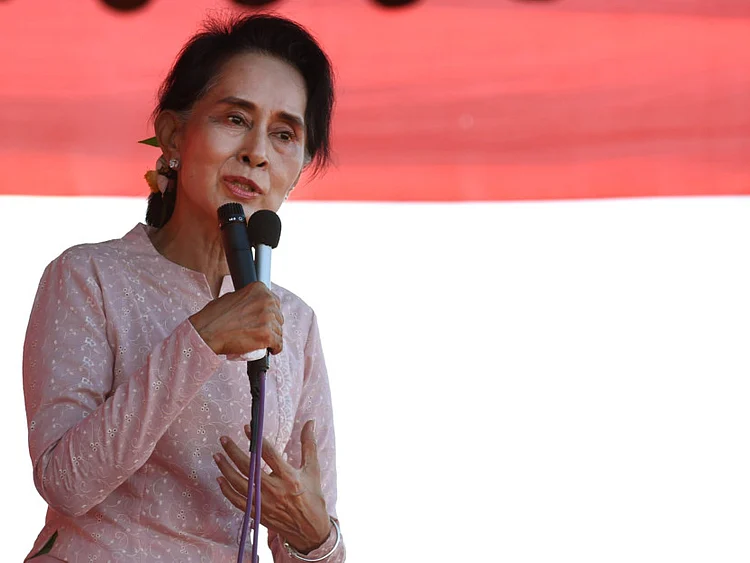It has been a quarter of a century since Myanmar’s most popular political party contested national elections. Back in 1990, Aung San Suu Kyi’s National League for Democracy won 80 per cent of the seats — a victory so thumping that the military government did what any self-respecting power-hungry junta would do: It cancelled the results.
Twenty-five years later, Suu Kyi’s party is being given a second chance. This time it must abide by the rules baked into a new military-moulded constitution. However well the National League for Democracy (NLD) does, one-quarter of parliamentary seats are reserved for the men in khaki. That is a helpful percentage given that any constitutional change requires a three-quarters majority plus one. The military is also guaranteed all three cabinet positions related to security, the subject closest to its heart in an ethnically kaleidoscopic country that has been fighting borderland wars with disaffected minorities for decades. Nor, whatever the result, is Suu Kyi permitted to become president. Article 59 (f) of the 2008 constitution bans anyone with foreign children from seeking that position. (Suu Kyi has two foreign sons.)
Despite such tight parameters, the elections that will take place next month are historic. They represent the end of a political process that began five years ago when the quasi-military government led by Thein Sein started dismantling decades of authoritarian rule. Media censorship was lifted, hundreds of political prisoners, including Suu Kyi, were released and labour unions were legalised. A new parliament, including a number of elected representatives from the previously banned NLD, acquired real teeth. Myanmar’s new crop of leaders wriggled from China’s tightening grip and began to court the West.
Unlike in 1990, it looks as though the generals are prepared to relinquish power. They feel their interests are protected, says Richard Horsey, a political analyst. The shift towards democracy has done little to threaten the wealth accumulated by the generals and their cronies, nor to challenge the basic structures of power. “The military have their red lines, but those red lines are already enshrined in the constitution,” he says. “Constitutionally, a coup is more or less redundant.”
Though the limits of the election are carefully delineated, the result is anyone’s guess. Almost certainly, Suu Kyi’s NLD will win. Yet, it may not repeat the landslide of 1990. Because the military has 25 per cent of parliamentary seats reserved, the NLD needs to win 67 per cent of contested seats to secure a 50 per cent majority in parliament. If it comes anywhere near that, it has a real chance of deciding who becomes president. Suu Kyi has suggested she would make herself the power behind the throne. “If the NLD wins the elections and we form a government, I am going to be the leader of that government whether or not I am the president,” she told India Today TV in her schoolmarmish style. Other scenarios are possible. One is that the ruling military-backed Union Solidarity and Development party scrapes together a quarter of seats on its own or in conjunction with smaller parties. It could then combine with the military to reinstall Thein Sein, the incumbent.
Assuming Suu Kyi’s party gets its just democratic desserts, it will mark the culmination of an extraordinary transition. Yet, it is not easy to be glib about the future. Since the reform process began five years ago, Myanmar’s people have been exposed to a far greater range of possibilities. But most, marginalised for decades, lack the economic or educational wherewithal to take advantage. Many, come to that, lack such a basic requirement as electricity. Nor, with the sanctions regime only partially lifted and uncertainty about everything from security to institutional competence, has the anticipated level of foreign investment materialised.
Greater freedom has brought unexpected side effects. With the military boot half lifted, festering tensions have bubbled up from the mud. There is a streak of nationalism and religious intolerance. Ugly laws have been enacted to protect the Buddhist majority at the expense of religious minorities. Persecution of the Rohingya — most of whom are not allowed to vote in this election — has intensified and morphed into a broader intolerance towards Muslims. In such an atmosphere, the NLD will struggle to pursue inclusive policies, let alone conclude a nationwide peace deal that slipped from the generals’ grasp at the last minute. “Democracy is not going to be a panacea for the ills of this country,” says one US official.
After next month’s polling, the NLD may finally find itself in power. Suu Kyi, even if not as president, could be running the show. Yet, it won’t be an unabashedly happy ending. The people’s choice is about to find out just what a mess the generals left behind.
— Financial Times
Sign up for the Daily Briefing
Get the latest news and updates straight to your inbox
Network Links
GN StoreDownload our app
© Al Nisr Publishing LLC 2026. All rights reserved.
